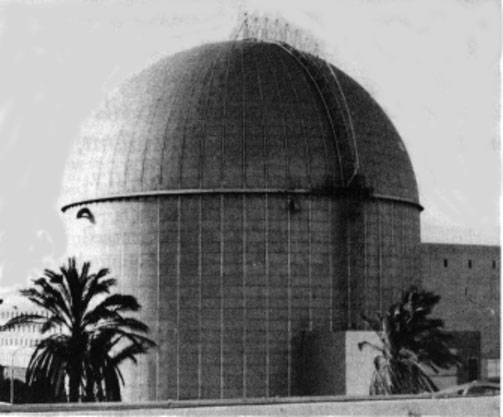
By Abraham Rabinovich Feb 16, 2006,
JERUSALEM, Israel (UPI) -- Defenders of Israel`s right to possess nuclear arms note that it is the only nation threatened with annihilation by neighbors. An argument no less telling is that Israel is the only state to have refrained from using, or flaunting, its alleged nuclear capability even when its back was to the wall.
In calling this month for a Middle East free of unconventional weapons, the International Atomic Energy Agency was clearly pointing at Israel in an attempt to make efforts to block Iran`s nuclear program more palatable to Muslim countries.
Israel, however, has already demonstrated an impressive measure of responsibility in matters nuclear. On the fourth day of the Yom Kippur War, its leaders were facing a situation more dire than any envisaged in worst case scenarios. Defense Minister Moshe Dayan returned from Sinai before dawn to the underground war room in Tel Aviv to report the failure of Israel`s counterattack on the southern front the day before. The division commanded by Ariel Sharon, one of the few generals not stunned into ineffectiveness by the surprise Egyptian-Syrian attack, had been dispatched over his objections on a fruitless maneuver while the remaining Israeli forces were driven back with heavy losses. On the Syrian front, part of the Golan Heights had already fallen and the front commander was preparing possible retreat from the rest of the heights.
The vaunted Israeli Air Force, which six years before had virtually won the Six Day War by itself, was neutralized over the battlefields by Soviet-supplied anti-aircraft missiles. Having been caught with its reserves un-mobilized, Israel was still unable to find its footing.
As Gen. Yisrael Tal, deputy chief of staff, would put it years later: 'The war was perceived at that point not just as desperate but as a war for our physical and national existence, nothing less.'
Gripped by that black vision, Dayan, Israel`s military icon, was warning those about him that 'the Third Temple is in danger.' The first two temples in Jerusalem had been destroyed by the Babylonians and Romans in antiquity. The Third Temple was analogy for the modern state of Israel.
Prime Minister Golda Meir was so unnerved by Dayan`s gloom that she briefly contemplated suicide, as she would later reveal in her memoirs. The situation was desperate enough for Dayan to propose distributing anti-tank weapons to civilians in case the Arabs broke through.
On that fourth morning, as Chief of Staff Gen. David Elazar reviewed options with his generals, one of them suggested resorting to 'special means,' according to published reports. This term is generally taken to mean nuclear weapons. Gen. Rehavam Ze`evi, who would years later found a right-wing party, supported the idea. However, it was vigorously opposed by Tal and another general. Chief of Staff Elazar, whose steadiness was one of Israel`s major assets, let the suggestion die.
Within hours, the tide on the Golan began to turn in the fiercest tank battles since the Second World War and Israel was spared the ultimate moment of truth.
It can be presumed that any nation possessed of nuclear weapons would give at least a passing thought to their use if it senses existential danger. The fact that Israel did not even threaten their use in its darkest hour reflects a sense of responsibility that negates any equation with Iran which has threatened Israel`s annihilation even before it has a nuclear bomb. 
The high command did decide on one far-reaching measure that day -- an air strike against Syrian military headquarters in Damascus. Prime Minister Meir at first opposed any bombing of a city. She was finally persuaded that the Syrians needed to be reminded of their vulnerability to deter them from sending their armored divisions across the border. She insisted, however, that civilian targets be avoided.
The Nobel Prize-winning scholar Thomas Schelling has cited four instances in which a country possessing nuclear weapons might have been tempted to use them against a non-possessor but didn`t -- the early stages of the Korean War, Vietnam, the Yom Kippur War and the Soviet war in Afghanistan. Of these, he suggests, the most impressive 
example of restraint was Afghanistan since the Soviets, never suspected of
squeamishness, proved willing to lose a humiliating war rather than play their nuclear card. However, Israel was not confronting defeat in a foreign adventure but its own mortality. Given its record and given its neighborhood, Israel deserves the comfort of a discreet weapon of last resort.
(Abraham Rabinovich is the author of 'The Yom Kippur War,' hailed as the definitive study of the 1973 Arab-Israeli war.)
Israel
Journalist stoned for not wearing a head-scarf
al Qaeda document hints at a great deal more to come
Recruiting suicide bombers ruled not terrorism
Muslim Bites Dog
Russia: 'Arms deal with Hamas Lead government possible'
The Somali Muslim Network in the ICE Riots
-
“I think this is the end for ICE,” Jaylani Hussein, the executive director
of the Council on American–Islamic Relations, Minnesota (CAIR-MN), bragged...
2 hours ago



































No comments:
Post a Comment
Please keep it clean. Comments do not reflect the opinion of this blog and are the sole opinion of the commenter. We reserve the right to delete any comment for any reason. Of course, opposing views are welcomed.
Auto-flagged and monitored IP addresses:
Teksavvy - IP 76.10.141, Onterio, Canada.
Charter Communications - IP 68.188.68. Ballwin, Missouri